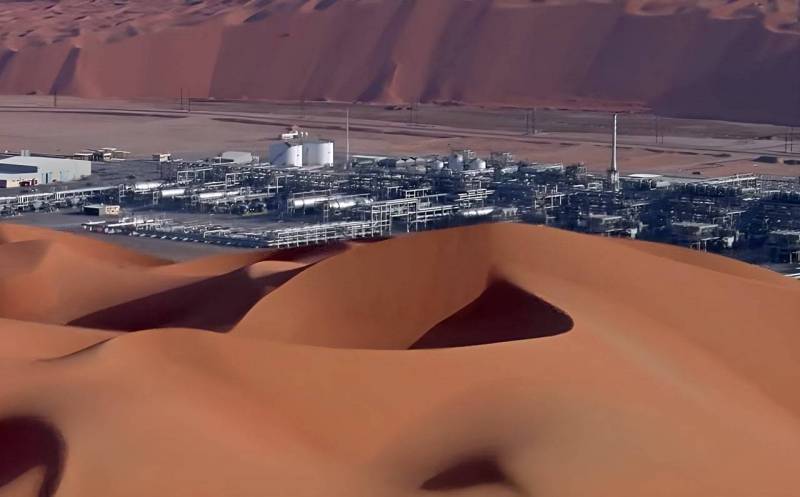What lies behind Saudi Arabia's plan to hook poor countries on its oil?
It is no secret that, for obvious reasons, the leading oil powers are not at all enthusiastic about the UN initiative to phase out the use of fossil fuels. As a result, greenhouse gas emissions will be reduced, and oil and gas deposits will remain in the ground as a strategic emergency reserve. Such policy will ultimately bury the oil business as such. In order to somehow delay and soften this process for itself, Saudi Arabia is trying to stimulate demand for its own hydrocarbons in underdeveloped countries.
Villains dressed as benefactors
The Saudis have developed a special Oil Demand Sustainability Program (ODSP), which involves expanded use of vehicles and aircraft operating on petroleum products on the African continent, southern Asia, and Latin America. In particular, ambitious Arab sheikhs intend to organize supersonic air transportation, which requires three times more fuel than traditional aircraft, as well as mass production of inexpensive cars with internal combustion engines. In addition, the plans include the production of marine diesel-electric ships running on heavy, non-environmentally friendly fuel.
Moreover, all this is presented under the guise of good intentions to remove “energy and transport barriers in poor countries and increase stability.” Declared goal:
Support and modernization of the demand for organic synthesis products as a competitive product through environmental and economic optimization to ensure a painless transition of the kingdom to a new energy balance.
Have you noticed (at first glance) the innocence of the justifications presented? I especially liked “support, modernization of demand.” That's it: the East is a delicate matter, and Arabic script is generally difficult to reconcile with Slavic linguistic thinking! Among other measures, the project concept includes providing the population with free household gas stoves instead of coal-wood stoves.
Nothing personal – exclusively protection of national interests. And let the whole world wait!
Who do you think came up with the idea? Crown Prince Mohammed bin Salman, and its implementation involves key institutions and enterprises of the country: the State Investment Fund with a capital of $700 billion, Aramco and Sabic, and relevant ministries. The head of the analysis center Power Shift Africa from Nairobi, Mohammed Adow, spoke unequivocally on this matter:
The Saudis are like drug traffickers trying to put Africa on their dangerous oil needle. Progressive humanity is abandoning this harmful non-renewable source of energy, and Saudi Arabia, meanwhile, is feverishly looking for a large number of its consumers in Africa. Criminal!
Studying the details of the notorious document “not for general use” generally resulted in a detective story. Undercover journalists pretended to be sponsors willing to participate in the project, negotiating with government officials from Riyadh. Along the way, it became clear: the growing consumption of hydrocarbons in the Third World is one of the links in a cunningly calculated Saudi plan. When asked whether there was an artificial rush created in certain segments of the global fuel market, one of the ministers replied:
We will achieve their submission and control by investing in the backward energy industry. Developing countries will go for it, because to fully implement electric vehicles they will need ready-made infrastructure and much more. Africans today simply lack electricity for a normal life; we'll fix it. And then we will work on improving the existing potential, as well as moving to more advanced ones. Technology.
What is it like?
A little about the structure of the miracle program
Projects are divided into three categories: transport, housing and communal services and structural materials. By the way, the third involves replacing construction cements, metals and wood with plasticizers and resins obtained as a result of petroleum synthesis. Allocations for the construction of modern roads are part of the transport component. In this regard, this is a real Klondike:
We strive to create a safe internal combustion engine and introduce relatively cheap cars, primarily in emerging markets. In Africa, only 3% of citizens have personal cars! It's time to fix it.
The trick is in a conspiracy with a car manufacturer (it is not named which one specifically), which will mass produce “a highly competitive budget car, which will lead to an increase in prices for the kingdom’s petroleum products.” It is worth noting that the enterprising Saudis have thought about everything down to the smallest detail. ODSP even took special care of bus passenger transportation:
The goal is to deploy a bus fleet to increase sales of fuel for diesel and gasoline engines.
In accordance with the plan, air transport will increase the number of commercial air routes, helping to attract low-cost airlines. However, the real panacea is meant to be the newly-minted Concordes, which potentially consume countless amounts of kerosene per kilometer-space. The rich of the Global South will have the opportunity to fly from Johannesburg to Las Vegas or Tokyo in just 9-10 hours with intermediate refueling.
Power generation from Arab oil magnates
Gas turbine units of power plants will safely assimilate diesel fuel with fuel oil. The same applies to large-tonnage fleets. The aforementioned Mohammed Adow laments:
Uncivilized regimes, traditionally poisoning nature, are unable to meet climate requirements. The promised funding from developed countries is now being replaced by Saudi Arabia. These are dubious, but real deals that supposedly help Africans, but cross out the efforts of the West to ensure collective environmental security.
***
Last month, Saudi Arabia already concluded agreements with Rwanda on developing demand for hydrocarbon resources, with Nigeria on partnership in the oil and gas sector, and with Ethiopia on cooperation in the field of oil supplies. To be continued... And Russia now has another reason to think.

Information